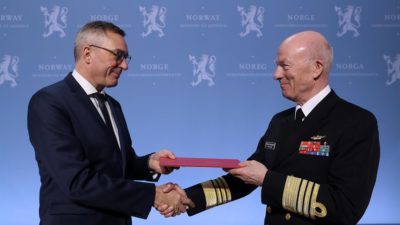NEWS ANALYSIS: General Major Eirik Johan Kristoffersen won’t take over as Norway’s new defense chief until August, but he already faces intense political conflicts over defense spending and plans for the country’s armed forces. Never before have Norway’s government and Parliament been more at odds, at a time when NATO is under severe pressure and global tensions are high.

“This is a scandal with historic dimensions,” editorialized newspaper Dagsavisen on Wednesday, after a majority in Parliament refused to even discuss the conservative government’s new long-term defense plan. Instead, they sent it straight back to Defense Minister Frank Bakke-Jensen for “improvements.”
The newspaper noted how there’s generally been broad political agreement on overall defense policy in Norway since World War II. Most parties also currently agree that Norway needs to boost its own defense and not rely quite so much on NATO allies coming to its aid in an emergency.
This week, however, opposition parties in Parliament that lately have been forming some strange new alliances banded together in a highly unusual maneuver. By utterly rejecting the government’s new long-term defense plan that Bakke-Jensen presented in April, they at least indirectly expressed a lack of confidence in him.

It also may have been a show of support for outgoing Defense Chief Haakon Bruun-Hanssen, whose recommendations for the new plan weren’t fully adopted by the government. Bakke-Jensen and his government colleagues also cut Bruun-Hanssen’s proposal for a defense spending increase of NOK 25 billion over the next eight years, to NOK 16.5 billion. The reduction in additional defense spending came despite promises from the government that tax cuts and defense were among its priorities in this year’s state budget. That budget, however, has since been revised by the Corona virus crisis.
The Labour, Center and Socialist Left parties, which form the left-center coalition in Parliament and ruled from 2005 to 2013, were first to reject the government’s defense plan. MP Anniken Huitfeldt complained it didn’t adequately boost military personnel (“We need more personnel now, not off in the future,” she told news service NTB) and that it put off plans to boost Norway’s naval defense after the accidental sinking of one of Norway’s five frigates. “We need a plan that includes naval defense and doesn’t shove difficult decisions into the future,” she added.
RELATED STORY: New chief’s been in battles before
MP Liv Signe Navarsete of the rural-oriented Center Party, meanwhile, had complained about the plan since Bakke-Jensen presented it. She claimed it didn’t pay nearly enough attention to how operative capability should be strengthened through more personnel, more tanks and helicopters for the Army. MP and leader of the Socialist Left party (SV) Audun Lysbakken didn’t like the plan’s lack of detail in terms of deadlines and funding. “We can’t negotiate (with the government) when in reality there’s nothing to negotiate over,” Lysbakken told NTB.
Then the three left-wing parties won the surprising support of Norway’s most right-wing party in Parliament, Progress, which withdrew from the conservative government coalition in January and has been stirring up trouble for the government ever since. Now it’s lagging badly in public opinion polls and seems desperate to position itself and attract attention.
It apparently chose the long-term defense plan as another means of making life harder than it normally is for Prime Minister Erna Solberg. When the left-center coalition said it wanted to send the long-term defense plan back to the defense ministry for “improvements,” Progress MP Christian Tybring-Gjedde seized on the opportunity and joined in. Politics makes strange bedfellows, as the saying goes, and Progress gave the left-center group an unlikely majority.
Tybring-Gjedde, who recently walked out in the middle of the foreign minister’s answer to one of his questions in Parliament, claimed the plan was far too “long-term,” covering eight years this time instead of the standard four. He also claimed it contained “fundamental weaknesses” in its commitment to the Army and Air Force.

That cleared the way for the plan’s rejection before Bakke-Jensen had a chance to defend it. Kjell Werner, political commentator for media group ANB, chided the opposition MPs for being too vague in their demands and not giving Bakke-Jensen enough specifics about what they actually want. He praised the government for opting for an eight-year plan that offers more “predictability” for the armed forces.
“It’s quite irresponsible for the opposition to just send back a defense plan without giving the defense minister any indication of how they’d prioritize differently,” Werner wrote on Wednesday. He accused the opposition parties of simply trying to position themselves “in a war where there are only losers.”
Now the ball is back in Bakke-Jensen’s court. He has earlier stressed that the new plan will provide the Army with more soldiers and operative capacity, modernize the Home Guard (which the incoming defense chief once headed), usher in greater capacity in the Air Force and map out a new fleet structure for the Navy. It’s unclear when a “new and improved” defense plan demanded by the opposition can or will be delivered.
For more on the man taking over as defense chief, click here.
NewsInEnglish.no/Nina Berglund

